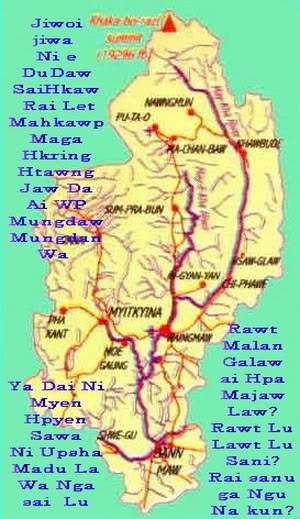By HTET AUNG
Burma's Election Commission has announced “areas where elections will not be held,” saying the constituencies are “in no position to host free and fair elections.”
Where are the areas, why can't elections can't be held there and how does the EC define the term “free and fair”?
According to a series of EC notifications issued on Sept.16, the areas are home to ethnic nationals in Kachin, Karen, Karenni (Kayah), Mon and Shan states.
In total, there are 300 village tracts and four townships that will not be allowed to vote in the election. A village tract is a group of from two to 10 villages.
Karen State will not be allowed to hold an election in 155 village tracts in seven townships.
The state is composed of seven townships, so the ban ranges throughout the entire state.
The most unstable areas are said to be in Papun, Thandaunggyi and Kya-in-Seikkyi. According to a list of constituencies for the Karen State parliament issued by the EC on Aug. 11, Papun is composed of eight urban wards and 33 village tracts, but the EC will not allow an election in 27 village tracts or 65.8 percent of the township.
Thandaunggyi has nine urban wards and 59 village tracts. There will be no election in 36 village tracts or 52.9 percent of the township. Kya-in-Seikkyi has 16 urban wards and 51 village tracts. No election will be held in 46 village tracts or 68.6 percent of the township.
The question arises: why does the EC believe there can be free and fair elections in the remaining areas of these three townships while they say that elections can not be held in more than 50 percent the same townships? Additonally, there's the issue of how those candidates can represent all the voters in the township?
There are more than 1.7 million people in Karen State, according to the Statistical Yearbook 2008 issued by Ministry of National Planning and Economic Development. Karen State shares seven seats in the People's parliament (Pyithu Hluttaw), 12 seats to Nationalities parliament (Amyotha Hluttaw) and 17 seats to the Karen State parliament.
The problem doesn't end there. In Shan State, elections can't be held in four townships and 59 village tracts. The four townships—Panghsan, Narphant, Panwaing and Mongmao—are under the control of the United Wa State Army (UWSA).
These four townships include the Wa Self-administrative Division granted by the 2008 Constitution. No elections will be held in these townships because of the tension between the UWSA and the regime due to the Wa refusal to transform its army into a border guard force (BGF) under the command of the junta.
Apart from these townships, more complications abound in Mongyan, Metmung and Mongla townships. The EC named two constituencies in each township in the Shan State parliament, but the names of 16 village tracts in Mongyan, 17 village tracts in Metmung and nine village tracts in Mongla, which will not be allowed to hold an election, were not included in the constituency list of the Shan State parliament issued by the EC in Notification No. 87/2010 on Aug. 11.
Instead, the EC listed Taping village tract as Mongla constituency 1 and Tapong village tract as Mongla constituency 2. Similarly, Monglway village tract became Mongyan's constituency 2. Consequently, in these three constituencies, there will be election in one village tract.
There are more than 5.4 million people in 55 townships in Shan State. The state will have 55 seats in People's parliament, 12 seats in Nationalities parliament and 109 seats in the Shan State parliament.
A similar situation can be seen in Kachin State's Ingyangyang, Sumprabum and Mansi townships. According to the list of constituencies for the Kachin State parliament, Ingyangyan is composed of four wards and 17 village tracts, but no election will be held in 15 village tracts or 71.4 percent of the township.
Sumprabum, located in the northernmost part of the country, has three urban wards and 27 village tracts, but the EC will not allow elections in 15 village tracts or 50 percent of the township. Similarly, Mansi is composed of four urban wards and 40 village tracts, where there will be no election in 17 village tracts or 38.6 percent of the township.
There are more than 1.5 million people in 18 townships in Kachin State, which has 18 seats in People's parliament, 12 seats in Nationalities parliament and 40 seats in the Kachin State parliament.
Not allowing elections in such a widespread ethnic area of the country raises serious issues about the Election Commission process used to determine why these constituencies will not be allowed to vote.
The commission should provide more explanation about why the constituencies do not qualify to vote, and it must be accountable in terms of providing a transparent “free and fair” election.
Sep 17, 2010
Subscribe to:
Post Comments (Atom)
WUNPAWNG MUNGDAN SHANGLAWT HPUNG A NINGGAWN MUNGMASA
WUNPAWNG MUNGDAN SHANGLAWT HPUNG A NINGGAWN MUNGMASA
CHYE JU KABA SAI
Sa Du N'Gun Jaw La ai Majaw N'chying wa Chyeju Dum Ga ai,Yawng a Ntsa Wa Karai Kasang Kaw na N'Htum N'Wai ai Shaman Chye ju Tut e Hkam La Lu Nga mu Ga law







No comments:
Post a Comment